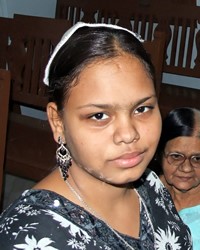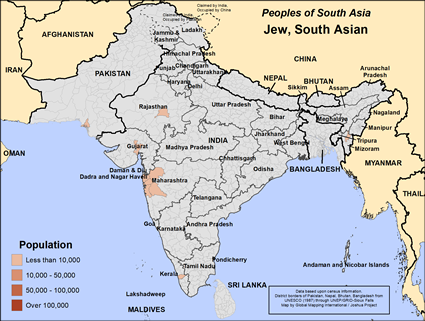Jewish, South Asian in India

Photo Source:
Emmanuel DYAN - Wikimedia
Creative Commons
|

Map Source:
People Group data: Omid. Map geography: UNESCO / GMI. Map Design: Joshua Project
|
| People Name: | Jewish, South Asian |
| Country: | India |
| 10/40 Window: | Yes |
| Population: | 5,900 |
| World Population: | 5,900 |
| Primary Language: | Marathi |
| Primary Religion: | Ethnic Religions |
| Christian Adherents: | 0.00 % |
| Evangelicals: | 0.00 % |
| Scripture: | Complete Bible |
| Ministry Resources: | Yes |
| Jesus Film: | Yes |
| Audio Recordings: | Yes |
| People Cluster: | Jewish |
| Affinity Bloc: | Jewish |
| Progress Level: |
|
Introduction / History
There are basically four main South Asian Jewish communities in India, each of a different origin and with different cultural characteristics and traditions: the Cochins, the Bene Israel, Baghdadis, and Bene Menashe. These Jewish people basically have assimilated into the Indian culture or joined the large groups of Indians. The Cochin Jews say their ancestors originally left Jerusalem after the destruction of the second temple in 70 AD and settled in Malaysia. In the ninth century AD they migrated from Malaysia and settled on the Malabar Coast at the town of Cochin located in Kerala, India. They were excellent traders. In 1344 they built a synagogue in Cochin and continued to practice their Jewish religion. Due to their skills with trading and languages, a number of Cochin Jews worked for the Dutch East India Company who first came to India in the 1600s. The Cochins to this day remain highly efficient in business and trade. A leading family among the Cochin Jews was the Rahabi Family. Ezekiel Rahabi, a strong leader, was friendly with Christians; however, he believed they were heretical. In 1750 he wrote his own Hebrew translation of the New Testament titled The Book of the Gospel Belonging to the Followers of Jesus to show Jewish people that their Messiah was yet to come as Jesus was not the Messiah. The translation was biased and incorrect. This has had a strong impact on the Cochin Jews who remain resistant to the gospel. Ezekiel's son David Rahabi was instrumental in revivifying Judaism among the Bene-Israel and the Baghdadi Jews. When England gave India their independence in 1948 there were about 2,500 Cochin Jews in India. Many began to emigrate to Israel. Only a few Cochin Jews currently live in India. The early 19th century marks the arrival of the Bene Israel. They arrived in Bombay, now called Mumbai, where they were merchants of sesame oil. A few Bene Israel became proficient teachers of Hebrew. These Bene Israel scholars published Marathi translations of classic Hebrew texts, Jewish prayer books, rabbinical commentaries and sermons.
What Are Their Lives Like?
Compared to the others, Baghdadi Jews are relatively recent settlers in India. Originally from Aleppo, Baghdad, Basra and Yemen they settled mainly in Calcutta and Bombay in the early nineteenth century during the British rule. As white non-Indians, the Baghdadis enjoyed special status and prospered under the British. Like the Bene-Israel, they decided to leave India when the country became independent. BNei Menashe (meaning "Sons of Manasseh") are the Mizo and Chin-Kuki tribesmen from Manipur and Mizoram in East India. They are commonly known as Chikim tribes. Centuries ago, they were headhunters. They had no written history and spoke languages similar to the indigenous people of Tibet and Burma. In teaching them the Old Testament, Christian missionaries began to find that there were many similarities between their mythology and the Old Testament stories! In 1951 one of their leaders announced that in his dream Israel was the ancient homeland of Mizo and Chin- Kuki. A number of the tribal people began to think of themselves as Jewish. In 1970 a number of them embraced Judaism and started to study and practice Judaism. Like the other Jewish groups in India, almost all have migrated to Israel from India.
What Are Their Beliefs?
Organized Jewish life in India continues despite the fact most have moved to Israel. Most of them incorporate all or some of the traditional practices of Judaism into their lives. They observe dietary laws, Sabbath, and circumcise male children. Jewish holidays are important to them. These involve the festivals of Passover, Shavuot (Feast of Weeks and Sukkot (Festival of Booths). Others are the high holidays of Rosh Hashanah, Yom Kippur, Sukkot, and Simkah Torah. The Torah and other Jewish literature has been transliterated into their local languages. The few synagogues they have continue to function with committed religious Jewish leaders. The synagogues do not have a resident rabbi, however, rabbis from outside the country often visit and extend teaching to the people. The people vary in their acceptance of Judaism from Orthodox, Conservative and Reform.
What Are Their Needs?
Many Indian Jews are mixed between Jewish and Indian ancestry. This has produced a problem for those in Israel when it to marriage or being accepted as Jewish. When the different Indian Jewish groups started to migrate to Israel the orthodox rabbinic council questioned their Jewish heritage. This carried over to problems when Indian Jews wanted to marry Israeli Jews from other countries. Surprisingly, the Court recognized the Bnei Menashe community as one of the ten lost tribes of Israel in 2005. Faithful to their Jewish religion, most of them are not open to Christ followers reaching out to them with the gospel. It is important that Messianic believers, especially in Israel, make the effort to develop trusting friendships with the Indian Jews so they can see the evidence of the living Lord in their lives.
Prayer Points
Pray these people will be open to hearing the teachings of Jesus and knowing that in them comes the deeper spiritual blessing of knowing God's grace. Pray that Messianic Jewish believers will reach out to these people. Pray they will be directed to where they can hear Bible radio broadcasts. Pray these Jewish people will firmly understand that following Christ will not separate them from their Jewish identity.